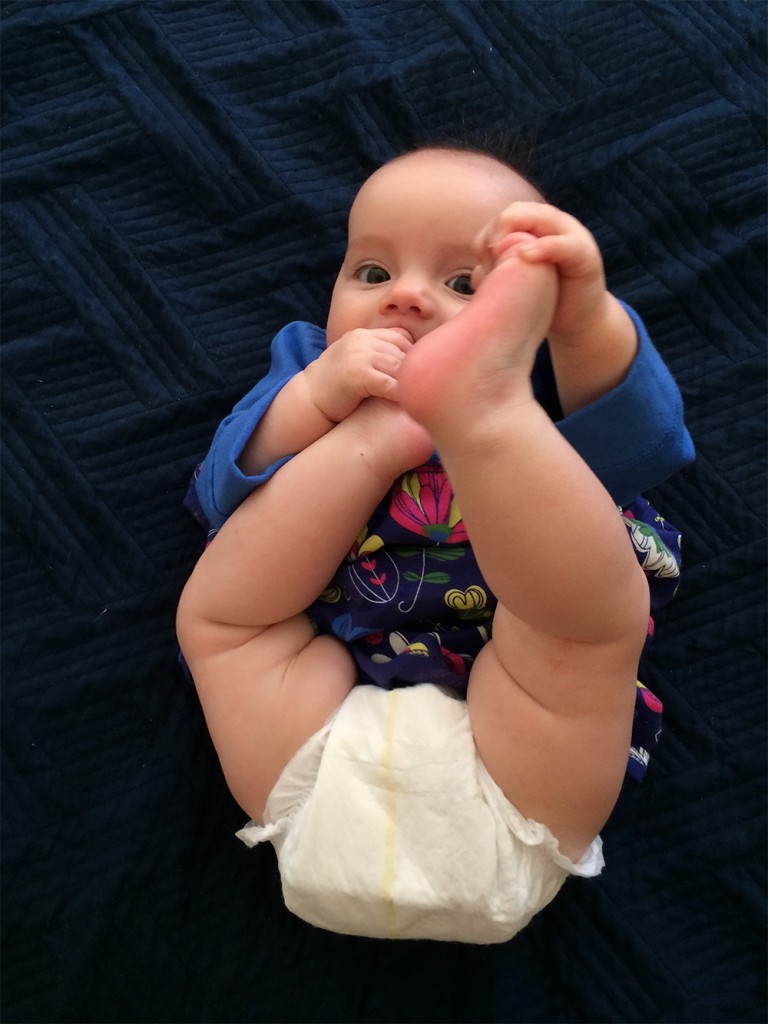
“Is 18 days too long to go without pooping?” a mom of a 3-month-old asked.
Believe it or not, yes, sometimes this is okay. How long is too long for an infant to go without pooping? The answer depends on age and diet, but most of the time babies that won’t poop are fine with little or no treatment. Here’s why babies can go a long time between bowel movements, and when you need to be concerned about constipation and other rare medical emergencies.
Infants older than eight weeks often go 4 or 5 days without a dirty diaper, and it doesn’t mean they are constipated. Breastfed babies, especially if they have not started solid foods, can easily go two weeks without a poopy diaper once they are 2-3 months old. Breastmilk is exactly what your baby needs, and so there is little waste product left for the baby to poop out. Exclusively breastfed babies are almost never constipated. They may go a long time without pooping, but their belly is not full of poop. If your baby seems uncomfortable, there is probably something else wrong. Breastmilk is a natural laxative and exclusively breastfed babies who have not started solid foods almost never need a laxative.
Formula fed babies and babies who have started solid foods often become constipated, but it is easily treated. If your baby seems uncomfortable, is straining to have a bowel movement, or is having hard, solid stools, they are probably constipated. Try massaging your baby’s belly, giving him or her a warm bath, or taking a rectal temperature. Taking a rectal temperature stimulates the rectum and also checks for a fever, which could indicate a more serious reason why your baby is uncomfortable. If your baby is still constipated and does not have a fever, try one ounce of prune or pear juice and/or or an infant glycerin rectal suppository. Infant suppositories are available over-the-counter at any pharmacy or by prescription from your pediatrician.
Newborn babies often poop after every feeding, about 6 times per day. In the first few weeks after delivery, your baby’s intestines are maturing and becoming more efficient at extracting nutrition from breast milk or formula. As their intestines get better at digesting food, the time between bowel movements gets longer and longer. Before you know it you have a two-month-old that is going several days without dirtying their diaper.
 Why do babies get constipated? Infants are still developing strength in their abdominal muscles, and hence they may have to work a bit to poop. Any mom who has just had a baby understands this– when you are term pregnant and don’t have much abdominal muscle strength, it is very hard to poop. New babies are in the same predicament– without much abdominal muscle tone they have to strain to poop, even if their poop is soft. It can be normal for babies to push or strain just a little to pass a stool– this is their exercise, they are building their abdominal muscles.
Why do babies get constipated? Infants are still developing strength in their abdominal muscles, and hence they may have to work a bit to poop. Any mom who has just had a baby understands this– when you are term pregnant and don’t have much abdominal muscle strength, it is very hard to poop. New babies are in the same predicament– without much abdominal muscle tone they have to strain to poop, even if their poop is soft. It can be normal for babies to push or strain just a little to pass a stool– this is their exercise, they are building their abdominal muscles.
Formula fed babies can have firm stools and may need some prune or pear juice as a laxative. Adult laxatives like milk of magnesia can be dangerous for infants. Never give an infant any other laxative unless recommended by a physician.
Once a baby starts cow’s milk at 12 months of age, they often get constipated. Cow’s milk is very constipating, but is important for calcium and vitamin D in your baby’s diet. Are you considering another kind of milk for your baby or toddler, such as organic, raw, almond, soy, rice, omega-3 fortified, breast or none? Each of these has certain risks and benefits, so be sure to read up on milk before you make a switch.
As your one-year-old transitions off breastmilk or formula, be sure to include plenty of fruits and veggies in their diet as a natural laxative. Prepared toddler foods are convenient for traveling and time crunches, but research shows they contain high salt and sugar. Dr. Sisk writes about how to be a savvy shopper for toddler food.
If your baby has blood in his or her stool, persistent crying, fever, or isn’t feeding normally, you need to seek medical care. Yellow or green spit-up or vomit is a medical emergency in infants as this can be a sign of a bowel obstruction. Bloody stools in infants can be due to formula intolerance or can be the result of a tiny rectal tear from passing a large, hard stool. There are rare but serious reasons why babies go a long time between bowel movements, have abdominal pain, have yellow-green (bilious) spit-up, or have blood in their stool. These uncommon conditions include intussusception, malrotation and volvulus, and necrotizing enterocolitis. Some rare genetic disorders such as cystic fibrosis and hirschsprung disease can first present as an infant that goes a long time without stooling, but usually these infants don’t have a period of frequent stooling in the first days and weeks after birth. Now that we have prenatal testing for cystic fibrosis, most parents know of this diagnosis before their baby is born.
Do not give your baby water. Although dehydration can be a cause of constipation, do not give your infant water unless instructed to do so by a physician. Giving water to infants can result in electrolyte disturbances that can be serious and sometimes fatal. Breast milk and formula contain just the right amount of sodium, chloride, potassium and other electrolytes. If you give them water, you can dilute these electrolytes. Although your baby’s kidney’s should correct for electrolyte changes, too much water can be more than their kidneys can correct.
As for the 3-month-old who went 18 days without a poop, he was fine! Because he was exclusively breastfed, happy, feeding well, and previously pooped regularly, I wasn’t concerned. He got a glycerin rectal suppository and pooped almost immediately, filling his diaper with that distinctive breastmilk poop that only a mother (and a pediatrician) could love.
This post appeared first on ChildrensMD.
Author: Dr. Kathleen Berchelmann, Pediatrician and Co-founder of MyCatholicDoctor
Editor: Samantha Wright, Marketing Director with MyCatholicDoctor
Make an appointment or send Dr. Berchelmann a message:
Leave a reply
